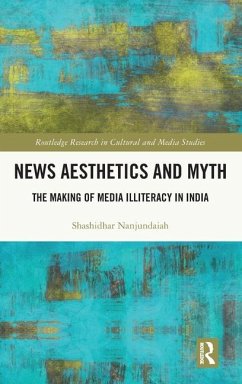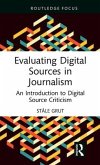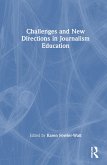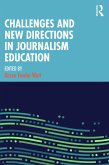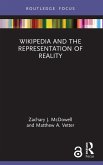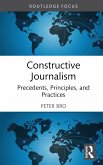This book considers the presence of media illiteracy in a world in which we are supposedly consumed by media, live a media life, in a media ecosystem, surrounded by mediated communication.
Unpacking this paradoxical situation, the author proposes that before venturing into media literacy, we must first understand the workings of how mystification occurs. Departing from the idea that aesthetics work on an agreed set of principles between art and society, the author applies this ideology of aesthetics to news-based narration. Using empirical cases from India, the author proposes demystification as a possible methodology to approach media illiteracy and recommends completely transformed media literacy programs that deliver to communities, drawing from the construct of critical pedagogy. The book offers the possibilities for a collectivistic, non-Western, postcolonialist model of learning by using the very collective and hierarchical identities of societies that must be critiqued.
This vital and innovative book will be an important resource for scholars and students in the areas of media literacy and critical media literacy, media education, journalism, mass communication, aesthetics and media technology.
Unpacking this paradoxical situation, the author proposes that before venturing into media literacy, we must first understand the workings of how mystification occurs. Departing from the idea that aesthetics work on an agreed set of principles between art and society, the author applies this ideology of aesthetics to news-based narration. Using empirical cases from India, the author proposes demystification as a possible methodology to approach media illiteracy and recommends completely transformed media literacy programs that deliver to communities, drawing from the construct of critical pedagogy. The book offers the possibilities for a collectivistic, non-Western, postcolonialist model of learning by using the very collective and hierarchical identities of societies that must be critiqued.
This vital and innovative book will be an important resource for scholars and students in the areas of media literacy and critical media literacy, media education, journalism, mass communication, aesthetics and media technology.
"This ground-breaking book... serves as an essential resource to those engaged not only in media literacy work but also to those invested in cultural studies and critical journalism studies."
-- Vinod Pavarala, University of Hyderabad, India
"Unexpectedly, but cannily, focusing on illiteracy, News Aesthetics and Myth skillfully theorizes the operations of mass media in an era of "post-truth." By applying Western philosophy to journalistic case studies in India, Nanjundaiah explains how and why authoritarian rhetoric is no longer merely national, but global, in scope."
-- Walter C. Metz, Southern Illinois University, Carbondale, USA
"Dr. Nanjundaiah's timely work is important for helping news audiences in India gain understanding of how systems designed to help communities thwart human progress via controlled access to media outlets needed to live informed lives. Media audiences are implored to take initiative and form community-affirming media literacy systems to reverse these disparate trends. The case studies, and the interpretive analysis of media illiteracy prevalence, offer striking commentary, useful solutions and a liberatory path forward. Global readers of this work will also discover strategies for resolving resonant challenges in their own nations and find inspiration in the colorful narratives told within."
-- Jayne Cubbage, Bowie State University, Maryland, USA
"This book makes a much-needed contribution to the field of critical studies of digital media in the ideologically polarized climate. Professor Nanjundaiah presents a compelling conceptual framework, backed by examples of digital media practices, that synthesizes theories of literacy, aesthetics, and ethics to help us understand and explicate how active engagement with digital media affordances has transformed media audiences from passive consumers to prosumers."
-- Anup Kumar, Cleveland State University, USA
"In News aesthetics and myth: The making of media illiteracy in India, Shashidhar Nanjundaiah, a Founding Dean and Professor in the School of Digital Media and Communication at Mahindra University, provides a deep, detailed argument interrogating linkages among trust, modernity, post-colonial challenges, news aesthetics and narratives, media literacy, and illiteracy... Nanjundaiah has written about Modi's India in particular, but many of his ideas can be used to suggest investigations and critiques of the uses of practiced aesthetics, especially in other post-colonial nations and countries with increasing nationalism and/or authoritarian media control. His analysis of systems of control which diminish the ability of citizens to be informed and his invitation for culturally aware, collectivistic, community-affirming media literacy responses provide suggested solutions with global applications."
-- Barbara Ruth Burke, University of Minnesota, USA
-- Vinod Pavarala, University of Hyderabad, India
"Unexpectedly, but cannily, focusing on illiteracy, News Aesthetics and Myth skillfully theorizes the operations of mass media in an era of "post-truth." By applying Western philosophy to journalistic case studies in India, Nanjundaiah explains how and why authoritarian rhetoric is no longer merely national, but global, in scope."
-- Walter C. Metz, Southern Illinois University, Carbondale, USA
"Dr. Nanjundaiah's timely work is important for helping news audiences in India gain understanding of how systems designed to help communities thwart human progress via controlled access to media outlets needed to live informed lives. Media audiences are implored to take initiative and form community-affirming media literacy systems to reverse these disparate trends. The case studies, and the interpretive analysis of media illiteracy prevalence, offer striking commentary, useful solutions and a liberatory path forward. Global readers of this work will also discover strategies for resolving resonant challenges in their own nations and find inspiration in the colorful narratives told within."
-- Jayne Cubbage, Bowie State University, Maryland, USA
"This book makes a much-needed contribution to the field of critical studies of digital media in the ideologically polarized climate. Professor Nanjundaiah presents a compelling conceptual framework, backed by examples of digital media practices, that synthesizes theories of literacy, aesthetics, and ethics to help us understand and explicate how active engagement with digital media affordances has transformed media audiences from passive consumers to prosumers."
-- Anup Kumar, Cleveland State University, USA
"In News aesthetics and myth: The making of media illiteracy in India, Shashidhar Nanjundaiah, a Founding Dean and Professor in the School of Digital Media and Communication at Mahindra University, provides a deep, detailed argument interrogating linkages among trust, modernity, post-colonial challenges, news aesthetics and narratives, media literacy, and illiteracy... Nanjundaiah has written about Modi's India in particular, but many of his ideas can be used to suggest investigations and critiques of the uses of practiced aesthetics, especially in other post-colonial nations and countries with increasing nationalism and/or authoritarian media control. His analysis of systems of control which diminish the ability of citizens to be informed and his invitation for culturally aware, collectivistic, community-affirming media literacy responses provide suggested solutions with global applications."
-- Barbara Ruth Burke, University of Minnesota, USA

